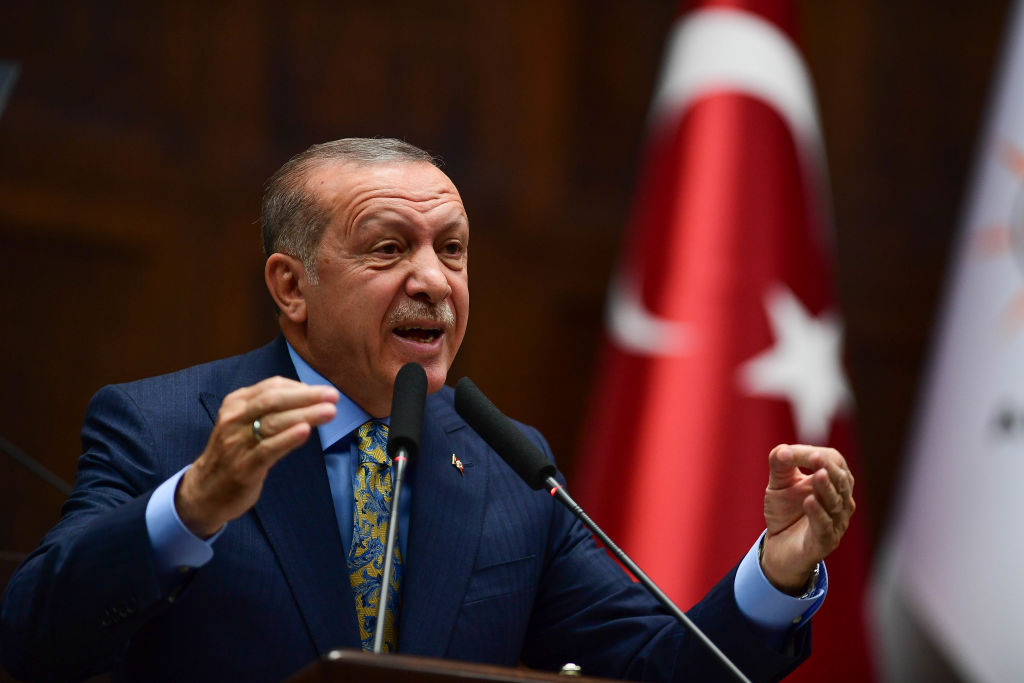 At a rally on February 13, ahead of Turkey's municipal elections -- slated for March 31 -- President Recep Tayyip Erdoğan blamed "global powers" (meaning the West) for the country's serious economic problems and massive rise in the price of produce. Pictured: Erdogan addresses the Turkish parliament on October 23, 2018 in Ankara. (Photo by Getty Images) |
At a rally on February 13, ahead of Turkey's municipal elections -- slated for March 31 -- President Recep Tayyip Erdoğan blamed "global powers" (meaning the West) for the country's serious economic problems and massive rise in the price of produce.
Alluding to "food terrorism," Erdoğan said:
"Until today, [neither global powers nor their local Turkish collaborator subcontractors] have... been able to make Turkey bend down the way they want it to on any issue. Seeing that they could not [achieve their goals] by means of foreign exchange rates, interest rates, diplomacy or perception politics, they are now trying to do it through onions, potatoes, eggplants, cucumbers and peppers."
Erdoğan's tirade was part of a propaganda tactic to keep the public from attributing its domestic plight, and the country's problems in the international arena, to poor government policies. Judging by surveys conducted during the past few years, which reveal that xenophobia in general and anti-Americanism in particular are widespread in Turkey, that tactic seems to be working wonders.
- According to a 2018 poll, conducted by Istanbul's Kadir Has University, 60% of Turks consider the United States to be their number-one threat.
- According to a 2017 survey by the pro-Erdoğan newspaper, Yeni Şafak, 96% of Turkish citizens think of America as an enemy; 94% see NATO as a threat; and 95.4% said that the Incirlik airbase should be closed to the American military.
- According to a 2014 Pew survey, 73% of the Turkish populace has an unfavorable view of the United States, and 70% hold a negative view of NATO.
- According to a 2007 Pew survey, "Of the 10 Muslim publics surveyed in the 2006 Pew Global Attitudes poll, the Turkish public showed... a higher level of negativity [towards Westerners] than is found in the other four Muslim-majority countries surveyed (Egypt, Indonesia, Pakistan and Jordan) as well as among the Muslim populations in Nigeria, Britain, Germany, France and Spain. Large and increasing majorities of Turks also hold unfavorable views of Christians and Jews."
"Turkish public opinion as a whole is perhaps the most xenophobic on earth," wrote University of Indianapolis Professor Douglas Woodwell in 2012. "Whatever the future, at least Americans can rest assured; while Turks may have a lower opinion of the US than any other country, they are equal opportunity haters."
Such xenophobia, however, long predates Erdoğan's rule. According to St. Lawrence University sociology professor Yeşim Bayar's 2014 book, Formation of the Turkish Nation-State, 1920–1938:
"In the aftermath of the World War I the Allied Powers' main goal in assuring the protection of minorities was to create liberal political cultures in Eastern and Central Europe's new states, in which nation-building majorities would be tolerant and non-coercive, and the newly minoritized would be politically local and anti-secessionist.... Yet, the liberal ideals of the Allies would directly clash with the proposals of the Turkish delegation.
"During this period the nationalist elite very often and zealously articulated anti-Western and anti-Christian sentiments. The Allied Powers' continuing territorial and economic control was viewed as an imperialist attack on the country; even labeled by some as a Crusade. Consequently, as Mustafa Lütfi Bey asserted, the goal of the TBMM [Grand National Assembly of Turkey] was first and foremost to save the abode of caliphate, save Istanbul from the hands of enemies. The Western world represented a body which was working toward the annihilation of Islam. Europe's direct attack is against Islam ... Relatedly, all internal tensions were attributed to external sources (i.e. Western powers.)"
This sentiment is reflected in the lyrics of Turkey's national anthem, officially adopted in 1921, which refer to the West as "that battered, single-fanged monster you call civilization."
Even after Turkey joined the Council of Europe in 1949 and NATO in 1952, anti-Western and anti-American attitudes remained popular among Turkish elites. Because such attitudes already prevailed in Turkey -- which has never been held accountable for them -- it is easy for the Erdoğan government to manipulate the public into believing that all their problems are the fault of the West and Christianity.
This view is possibly why Erdoğan, during an election rally on February 16, falsely claimed, "Our mosques are getting bombed and burnt down in the West -- in Germany and Western Thrace [Greece]."
Ankara's anti-Western statements and politics not only make Turkey an unstable and unreliable NATO ally, but also blind many Turks to the realities of the world, thwart their intellectual growth and render them unable to grasp what is really happening to them in their own country.
Uzay Bulut, a Turkish journalist, is a Distinguished Senior Fellow at Gatestone Institute. She is currently based in Washington D.C.


